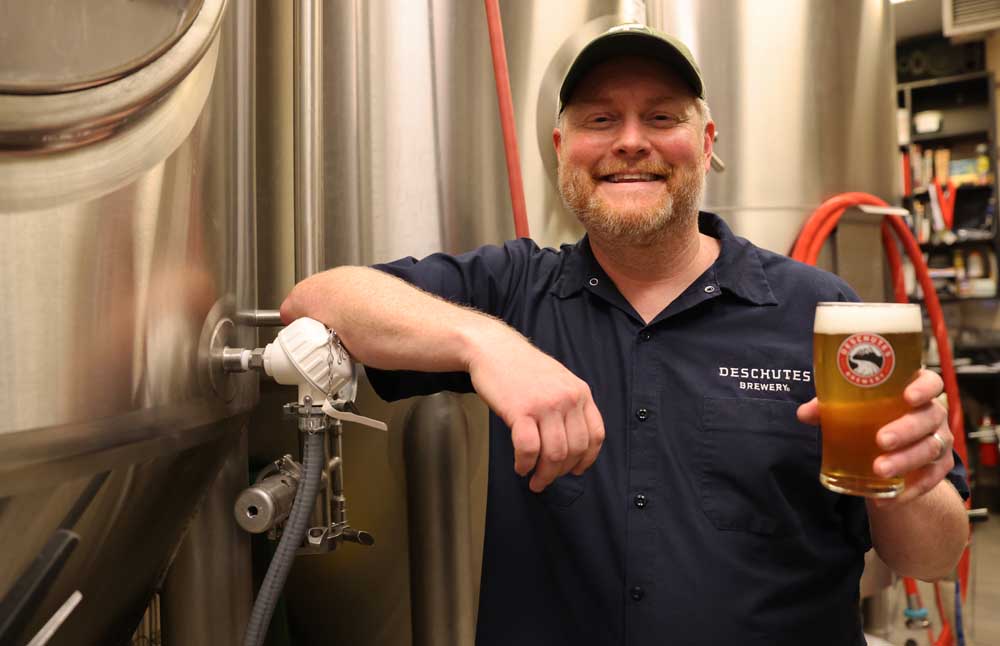Oregon craft brewers brew up collaboration
Published 4:30 am Sunday, July 10, 2022

- Robin Johnson, a brewer at Deschutes Brewery, with a collaboration beer.
Craft beer brewers have a history rich with experimentation and collaboration.
They share brewing tips and information, often not worrying about competition or trade secrets as it’s difficult to duplicate a recipe that depends on unique geographic variables like air and water.
It’s a mindset that’s unlike large breweries, which are skilled at brewing beer exactly the same way each time. Craft brewers not only embrace the inexactness, they celebrate their discoveries together.
“It never ceases to amaze me the collaborative nature of this industry,” said Christina LaRue, Oregon Brewers Guild executive director.
“Everyone wants to make the best beer, but at the same time they support each other. It’s ingrained in our industry.”
Last year, Deschutes Brewery, Oregon’s No. 11 top craft beer in terms of volume, teamed up with Xicha Brewing in Salem to release abut 100 to 200 barrels of beer they brewed together. Earlier this year, Deschutes paired with Western Collective Brewing in Idaho to produce a small batch of beer — 10 barrels in Bend and 35 barrels in Idaho.
“Everyone is open to it now,” said Robin Johnson, Deschutes Brewery head brewer. “For us it is an opportunity to learn from each other. We all get so busy and locked into one avenue and process that works. So when you collaborate, it gives you an opportunity to see how someone else works through the process of recipe design and ingredient selection.”
Brewers at Xicha Brewing and Deschutes began first with emails, tossing out ideas and flavor profiles. Then through the process, they brewed what turned out to be a fruit-forward beer using guava and raspberry flavors that pairs well with food and is popular in Central and South America, Johnson said.
The fruit intensity makes the beer a tad tart and is 5% alcohol by volume, he said.
To make the Catherina Guava Raspberry there was a lot of recipe tweaking and tasting, but once it was “nailed down” with everything we wanted, the two breweries small batches on draft and in cans, Robinson said.
“There’s always something we can take away from a collaboration,” Johnson said. “We might hear about a new variety of hops or a new strain of yeast that we had not heard about before.”
Collaboration usually produces something fun, said Bart Watson, chief economist from the Brewers Association, a Colorado-based trade association. It also forges friendship and connections.
“The small brewer will learn from the larger brewery,” Watson said. “Collaborations challenge the brewers and gives them new ideas. The small brewers are closer to trends and can do things small scale. Collaboration is unique to craft breweries.”
Learning from each other
Xicha (pronounced Chicha) is a culinary forward kind of pub, Johnson said. Making a beer with flavor profiles that complement food can provide inspiration, he said.
Maggie Antúnez, the managing owner, of Xicha Brewing, said the brewery released its second batch of the collaboration beer in their pub in June. The first release sold out quickly.
“It’s a great community between brewers,” Antúnez said. “The Bend team came to our location. The fruit forward and pairing with food was important for the collaboration. We work closely with our brewer and our chef. We don’t want our beer to overpower our food.”
Like many craft brewers, Xicha began in the garage of the head brewer, Matt Decopolis, chef Ricardo Antúnez, and Ben Mendoza about seven years ago. Xicha is a small brewery, having sold about 380 barrels of beer last year.
“Beer brewers are a community,” Antúnez said. “We share our recipes and are creative with each other. Working with someone else you get to expand your knowledge.”
When Deschutes partnered with Western Collective in Boise, it came as the result of referrals from a yeast producer and an Idaho hop farm, Mill 95. Using the Idaho hops, the trio produced a West Coast-style IPA known for bold hop aroma, high bitterness, and citrus and piney flavors called Tropical Liberation.
“Pairing beer with food is a huge inspiration,” Robinson said. “There’s such a broad range of beers, sours, hoppy (flavored) and I’m inspired to work with them.”
Cary Prewitt, Western Collective Brewing owner and founder, said he encourages collaborations with breweries that he respects and make great-tasting beer.
The beer made with Deschutes and Western Collective has a unique flavor profile created by the collaboration, the hops that went into the beer at five different times and the genetically modified yeast, Prewitt said. Typically brewers add hops twice in the beer making process.
The beer was released over the Fourth of July weekend and was well-received in the brewery’s tap room, he said.
“These 30-barrel batch collaborations are interesting,” Prewitt said. “What we can learn from each other and how we do it make it interesting. It turned out to be a unique beer for everyone.”






